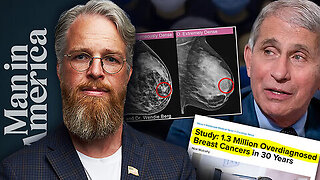Premium Only Content

How Coolant and Transmission Fluid Mix, How It Affects The Vehicle, and What Can Be Done
In this video I'll go over how transmission fluid can enter the cooling system and/ or how coolant can enter the transmission fluid. I'll also go over how this negatively affects both the cooling system and the transmission. I then discuss what can be done about this issue.
A failure such as this is either caused by someone adding the wrong fluid to the wrong system or by a faulty transmission fluid cooler. And while people do add the wrong fluid to the wrong system it's far more likely that this is caused by a faulty cooler. A leak develops in the cooler allowing either transmission fluid to enter the cooling system and/ or coolant to enter the transmission.
This truly messes up a bunch of stuff. In the cooling system all of the rubber can be ruined by transmission fluid. It can also affect the cooling systems ability to properly cool the engine. If coolant gets into the transmission it can ruin the clutch packs and potentially the whole transmission. Usually a rebuild or a transmission replacement is needed. ***If the transmission is replaced or rebuilt due to this then it is recommended to flush the cooler lines to the transmission to remove any coolant so that the new transmission is not affected.***
Of course, to repair this, the transmission fluid cooler will have to be replaced. If the cooler is internal to the radiator then the radiator will have to be replaced. If transmission fluid entered the cooling system then the cooling system will need to be thoroughly flushed out until there is no more transmission fluid in the cooling system. I'd also recommend replacing all the rubber components in the system. If coolant has gotten into the transmission it is likely the transmission will have to be rebuilt or replaced. However, It's worth a try to do a thorough transmission fluid flush with a filter replacement. (this may take several dozen quarts of fluid to do properly.)
Note: this video is superficial in nature and cannot apply to all vehicles out there. A lot of the information given in the video is a matter of opinion and may not be best for your vehicle given factors unknown. Do your own research.
Images shown in video depict not only contaminated fluid but also uncontaminated fluid. Contaminated fluid with have a "milky", thick, opaque, look to it. Some coolants are red or orange. Red and orange coolant is supposed to be red and orange. But when it gets contaminated with transmission fluid it becomes "milky" and thick. Also, most transmission fluids are red or some shade of red. This too will become "milky" and thick when coolant is mixed in with it. In both cases, with the coolant and transmission fluid, the severity of contamination may vary.
GENERAL DISCLAIMER
Barbour's Auto Help is not responsible for any damage or personal injury incurred in the process of performing any auto repairs done by you the viewer. Automotive repair is extremely dangerous. Repair your vehicle at your own risk. It is the viewers responsibility to verify all information and procedures as outlined in YOUR REPAIR MANUAL AND OWNERS MANUAL FOR YOUR VEHICLE. Owning and using a repair manual suited for your vehicle is essential for correctly and safely performing ANY repair to your vehicle. Always wear safety glasses and protective gloves and heed all instructions for use applicable to any piece of equipment you may use. Due to circumstances out of the control of Barbour's Auto Help, Barbour's Auto Help makes no guarantee that by the use of the information given in this video a quality repair will be made. Barbour's Auto Help makes no guarantee that the information provided is totally complete, synchronized and accurate. Verify everything using an appropriate repair manual.
Repair your vehicle at your own risk! Barbour's auto help does not guarantee a proper repair using these techniques.
-
 LIVE
LIVE
Timcast
1 hour agoTrump DEMANDS Apology From Zelenskyy, FREEZES ALL AID, Ukraine Warfront Faces COLLPASE | Timcast
7,111 watching -
 LIVE
LIVE
Bannons War Room
14 days agoWarRoom Live
23,163 watching -
 54:57
54:57
BonginoReport
3 hours agoIntroducing Hayley Caronia (Ep.152) - 03/04/2025
67.5K62 -
![🔴[LIVE] GAME OVER! The Stock Market Crash Will Get Worse || The MK Show](https://1a-1791.com/video/fwe2/39/s8/1/S/o/k/p/Sokpy.0kob.1-small-The-MK-Show-Mar.-4th.jpg) LIVE
LIVE
Matt Kohrs
10 hours ago🔴[LIVE] GAME OVER! The Stock Market Crash Will Get Worse || The MK Show
956 watching -

Dear America
11 hours agoPam Bondi Announces NEW EPSTEIN FILES + Trump's First Speech To Congress!
49.9K14 -
 LIVE
LIVE
Wendy Bell Radio
6 hours agoDemocrats Think They're Still In Charge
12,199 watching -
 LIVE
LIVE
2 MIKES LIVE
2 hours agoTHE MIKE SCHWARTZ SHOW with DR. MICHAEL J SCHWARTZ 03-04-2025
350 watching -
 15:50
15:50
T-SPLY
9 hours agoCNN Finds Out Not One Democrat Is More Popular Than Donald Trump
3.54K3 -
 1:30:01
1:30:01
PMG
3 days ago $0.44 earnedBREAST BUTCHERS: Thousands of Women Mutilated by Fake Cancer Diagnoses!
4.39K3 -
 42:37
42:37
Degenerate Jay
18 hours ago $3.57 earnedWhy The Wonder Woman Game Was Really Cancelled - Rejected Media
40.3K4